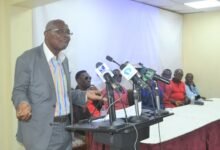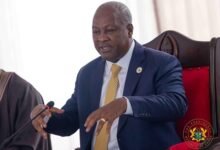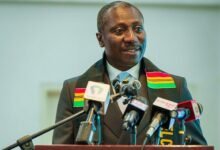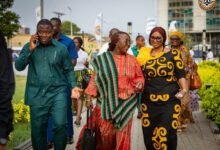Gov rolls out ‘Water for All’ programme

A programme to make potable water accessible to all Ghanaians to enable them live healthy and productive lives is expected to be rolled out by government within the coming months.
Dubbed ‘Water for All,’ the programme is to be undertaken through sustainable policies and actions that take account of ecological systems to reduce pollution and promote water use efficiency.
Minister of Sanitation and Water Resources, Cecilia Abena Dapaah, said, the programme would also pay attention to strengthen decentralised management organisations, improve information and knowledge base, intensify education and awareness and monitoring.
The minister was speaking in Accra on Tuesday at the inauguration of a 15-member governing council of the Water Resources Commission.
It is chaired by Minta Afosa Aboagye, and members are; Ben Yaw Ampomah, Yendor Ziema Jacob, Worlanyo Kwadjo Siabi, Sylvester Darko, Abdul Noor Wahab and Richard Oppong-Boateng.
The rest are Prof. Mike Yaw Osei-Ateweboan, Dr Micheal MawutorTanu, Ransford Sekyi, John McDonald Allotey, Collins Anim-Sackey, Togbe Gbogbolulu V, Afua Gyamfua Owusu Akyaw and Adelaide Ntim.
A successful programme, Madam Dapaah noted, would require protection of water resources from pollution and sustained management and equitable sharing of the benefits of trans-boundary surface and ground water resources.
She, therefore, charged the board to expedite the drafting of Legislative Instruments on Buffer Zones and Pollution Control.
She also called for the implementation of existing regulations and policies such as the Buffer Zone policy to assist in restoring, and maintaining the ecological integrity of water bodies and to provide socio-economic benefits to local communities.
Additionally, Madam Dapaah urged the board to promote international cooperation and improve relationship with Ghana’s riparian neighbours.
She said the board should build consensus through effective participation among all users and managers of water resources.
“The participation should prompt significant changes in attitudes by raising awareness of people through interactions among the stakeholders, particularly NGOs and traditional authorities whose activities should be positively recognised and encouraged,” Madam Dapaahsaid.
She asked that the operations of decentralised management and co-ordinating boards of river basins should urgently be rekindled and broadened to tackle the myriad problems facing major water bodies.
Madam Dapaah reminded the board that “your work cannot be over until the entire water crisis that affects the population has been averted and water security is achieved.”
Mr Aboagye expressed gratitude to the government for the opportunity, saying “the task is enormous but we’re ready to work.”
He noted that the use of chemicals by industries, illegal mining and deforestation, among resulted in the pollution of water bodies.
Mr Aboagye said there was the need for large volumes of water in the face of government’s industrialisation drive,and the board would promote recycling waste water for industrial use.
He said the board would intensify cross-border co-operation for the protection of water resources.
BY CLAUDE NYARKO ADAMS







